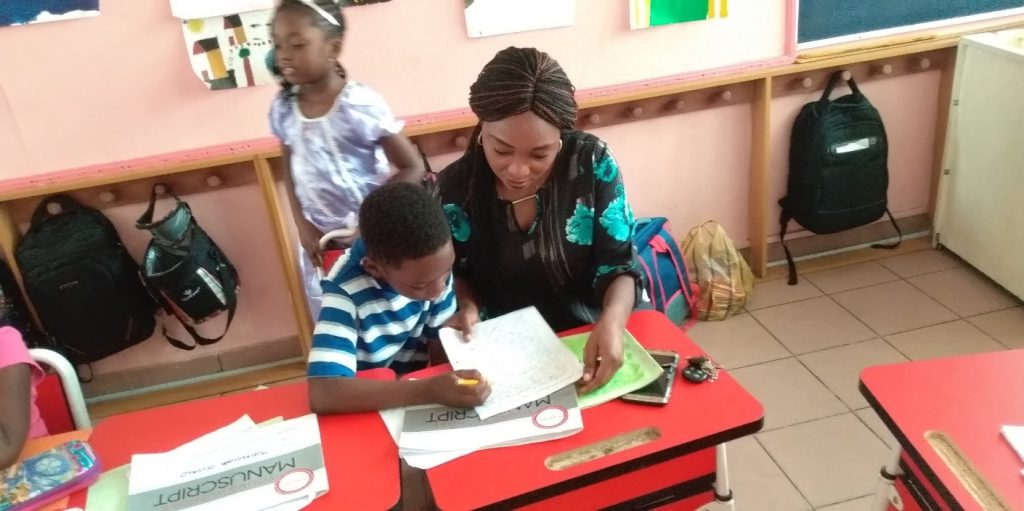MY CART
- No products in the cart.
Subtotal:
₦0
BEST SELLING PRODUCTS
₦100

Written by: Adeola Eze
Although a parent’s role in their children’s learning evolves as the child grows, one thing remains constant: we are our children’s learning models. Our attitudes about education can inspire theirs and show them how to take charge of their own educational journey.
“We want to keep children in charge of their learning and become responsible for it. We want them to be responsible for their successes and failures.”
– Dalton Miller-Jones, Ph.D
In pursuing excellence in academics and in life, a child needs to learn to be responsible for his/her own leaning. And this can only be achieved if the parents are deliberate and intentional about growing their child to be a deliberate learner.
Today, I will like to share my ideas on how, as a parent, you can nurture a deliberate love for learning in your child.
 Here are a few ways this can be achieved:
Here are a few ways this can be achieved:

Parents should start out being deliberate learners themselves. Your child should see you make out time to want to learn something new each day.
When a young child begins school, the parent’s job is to show him how school can extend the learning that began at home, and how exciting and meaningful this learning can be.
Learning should start from the home, not from school and should continue also at home after the child must have started school.
In life, as adults, we have come to understand that we have to know where we want to go if we expect to get there. Our children must grow up with that same notion on anything they have to do in life, especially, in relation to their academics. In other words, you need to encourage your child to have a plan for his/her academics.
It is important as parents to find time to sit with your child and work together to set achievable goals for his/her academics for a particular period. Have your child pin the goals against the wall in the room and review it from time to time together to check how far and how well the goals are being achieved.
 You can help your child to enjoy studying by making it a part of the family routine, so your child grows up knowing a day should not pass without some form of studying. Create a daily study session of about twenty minutes or more, depending on your child’s age. Let your child grow up thinking that is how life is supposed to be because having a studying time in your daily routine is just like sleeping and eating, you just must do it every day! I believe strongly that children who hope to improve their skills in any area should devote an hour or more each day to practice on those skills with full concentration.
You can help your child to enjoy studying by making it a part of the family routine, so your child grows up knowing a day should not pass without some form of studying. Create a daily study session of about twenty minutes or more, depending on your child’s age. Let your child grow up thinking that is how life is supposed to be because having a studying time in your daily routine is just like sleeping and eating, you just must do it every day! I believe strongly that children who hope to improve their skills in any area should devote an hour or more each day to practice on those skills with full concentration.
Even if you aren’t helping them to complete their work, just sitting there and reading your favourite book or working on your own project on your laptop will go a long way to boost your child’s confidence and determination to succeed. However, we do understand that as parents, in a bid to meet up with career and work- related responsibilities, you might not always be available. In such an instance, it is important and necessary to get home tutors for your child to provide the studying supervision needed to excel and be outstanding. Without a positive adult supervision, children while growing up would not go for their books or engage in studying on their own, until it becomes a part of them. If you cannot be around, then ensure someone else that is capable of monitoring your child’s after school activities is available.
Children need to read as much as possible in order to practice until reading is effortless. This is not studying. This reading time is quality time for whoever is involved. Reading with your child creates more room for bonding. Through this your child will learn to enjoy a range of books.
Starting in pre-school, if a child reads 20 minutes a day at home, they will hear about 1.8 million words a year. They will have read for 851 hours by the time they get to Year 6, and are likely to score higher in assessments. From the time your child is born, reading out loud to your child is a positive influence on him/her. As your child grows, daily reading will help the brain make connections between written and spoken word, expanding the child’s vocabulary in the process. In addition to that, vocabulary skills equate to masterful spelling. In fact, reading, spelling and vocabulary are critically important to a child’s lifelong achievement.
The benefits of reading every day will positively impact on all areas of a student’s academic and life success.
Yes, they are not too young for this. As children practice and study daily, they need to be continually aware of their own performance and be focused on correcting and adapting as it deems appropriate. This kind of in-the-moment self-assessment is critical regardless of whether a teacher is involved (do not leave everything to the teacher) or a parent. They must develop a strong ability to objectively assess their own performance so that they can make any necessary adjustments to their practice. This level of reflection can only be achieved if the child grows up with it. A child that is able to do this effectively while growing up will excel at this on becoming an adult, which is key to making progress in life.
 Giving your child regular feedbacks on how he/she is doing at a particular area will help the child bear in mind what to work on to improve. Lack of feedback will result in no growth. Sometimes, children can tell on their own whether they are doing things right or not. But very often this is the area where having a great parent can make all the difference.
Giving your child regular feedbacks on how he/she is doing at a particular area will help the child bear in mind what to work on to improve. Lack of feedback will result in no growth. Sometimes, children can tell on their own whether they are doing things right or not. But very often this is the area where having a great parent can make all the difference.
A parent who is keen on nurturing a young achiever will keep an eye on what and how the child is doing and then guide the child on how to get better through regular feedback. This way, the child can take deliberate steps of his own to improve in his work, knowing fully well areas he needs to focus on.
The same way children get rewarded for behaving nicely at the supermarket or in school or for getting their morning chores done neatly and in time, they should also get rewards/bonuses for studying and excelling. This will go a long way to boost the child’s confidence and he or she will acknowledge that reward by putting more effort to get the extra studying done. Also, if a child fails to meet up with expectations based on what the child has learnt, especially a child that does have the potential to do well, certain incentives and privileges should be withdrawn from the child so the child comes to understand that life is about what you put into it. If you want the best, then you have to put in your best. Otherwise, your child may grow up with a feeling of entitlement while intentionally not meeting up with given expectations. Monitor your child’s input. If not measuring up, guide through the way. If intentionally not pulling their weight on their studies, it is not out of place to ensure they lose out on some new promised games, fun time, TV time, outing to exotic places, international trips. Yes, you want them to be the best? Let them know if they cannot cut it when they are capable of doing that, then they don’t get those extras.
Parenting requires patience, tolerance, determination, resilience, perseverance and deliberate steps in raising children that will affect their generation positively. I hope you find these few tips helpful in raising your child to be a deliberate learner.

Adeola Eze is the Educational Director and Lead Writing Mentor / Facilitator at Jordan Hill. She is the author of The Adventures of Class 3A: Storm in the Forest and One Beautiful, Bright and Sunny Morning… She has over twenty years’ experience in classroom teaching and is the mother to three children, two of which are in the university. She is very passionate about working with children and bringing out the best in them. She believes children have the potential to excel if they are put in an enabling environment which she surmises can only happen with parents and educators taking deliberate steps to provide such.
